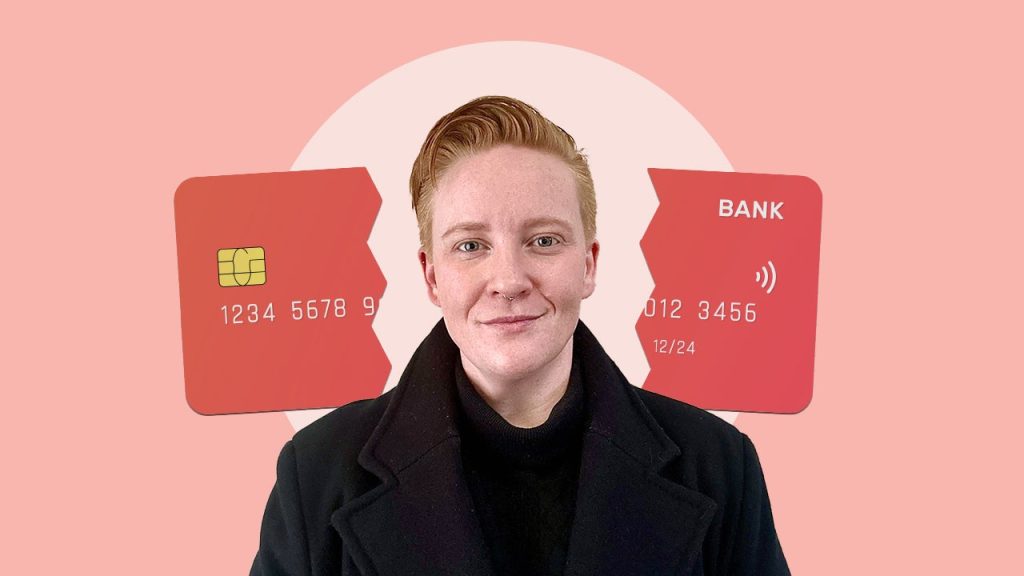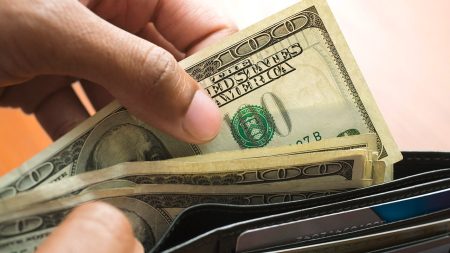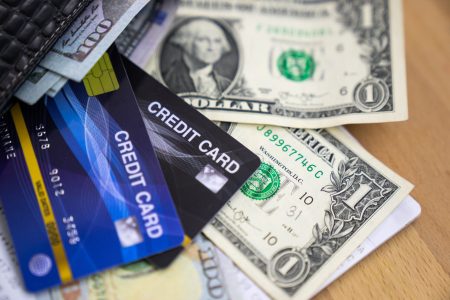Ericka Smith ended her marriage in 2024 with several credit cards and $25,000 in card debt.
“We didn’t really talk to each other about money,” the 30-year-old Navy veteran and Washington state resident said. “It was just kind of like, she wanted it, or I wanted it, and we just did it.”
The subject turned into a major stressor and a contributor to health issues Smith found herself dealing with. It took a divorce and a significant mind shift to dig herself out of the card debt hole — and she’s made big progress in just one year.
“I don’t think about it most days,” she says of her debt now. “It’s a very nice change.”
Smith’s experience — which included one maxed out card — is unfortunately not unique. Almost 2 in 5 cardholders (37 percent) have maxed out a credit card or come close since the Fed started raising interest rates, Bankrate’s Credit Utilization Survey found.
Today, Smith has a healthy budget and works on her remaining debt. It has taken plenty of willpower and decisive action to get to this point. If you’re struggling with ballooning credit card balances, here’s how you can do the same — plus, some advice from Smith and a certified financial therapist.
When lack of communication turns into debt
Smith opened two travel credit cards in 2021 to earn sign-up bonuses that would pay for her honeymoon. That part was easy. Smith and her partner at the time used the cards for their wedding expenses and paid them off in full.
“I had cash sitting aside,” Smith says. “It was all good.”
Between flights and hotels, the honeymoon cost the newlyweds about $4,000 to $5,000 in rewards. The couple traveled down the West Coast and looped back to Nevada — their final destination, before flying back home to Salt Lake City.
For about six months, Smith was able to keep her cards paid off consistently. Then, inflation reared its head – a new challenge felt by Smith and plenty of others across the country. More than half of cardholders who’ve maxed out a credit card or come close (54%) blame inflation or high prices, according to Bankrate’s Credit Utilization Survey.
“Our rent went up,” Smith says. “Our insurance went up. Food costs. We also had increases in tuition costs for both of us.”
Smith and her wife were in college at the time. Smith also worked full-time as an accounting clerk, which was the couple’s only consistent source of income.
The newlyweds didn’t have a budget. They didn’t talk about money or how they were spending it. Each bought what they wanted without planning for it. Expenses like food, gas, vacations and experiences ended up going on credit cards.
They were discovering another common challenge faced by people in committed relationships: the importance of financial alignment and communication. 33% of U.S. adults in committed relationships have spent or are spending more money than their spouse or partner would be OK with, Bankrate’s Financial Infidelity Survey found.
According to Megan McCoy, a certified financial therapist and assistant professor of personal financial planning at Kansas State University, it’s not uncommon for couples to avoid the topic of money — and that comes with consequences.
“The more rare a conversation about money is, the more tense what happens is going to be,” she says.
About a year and a half into the marriage, one of Smith’s travel cards was maxed out, while the other had about a 50-percent utilization rate. The same happened to other cards she’d had for a much longer time.
Credit cards became her biggest stressor. She worked and went to school full-time while juggling her new family life and everything that came with it. Yet, it was her credit card debt she worried about the most.
“I would wake up so nauseous from anxiety,” Smith says. “It was a real catalyst of most of my major health issues… because that stress went on for so long.”
Bankrate insights
Over half of Americans who’ve maxed out a credit card or come close (51%) felt more stressed about their finances, according to Bankrate’s Credit Utilization Survey.
Smith felt there wasn’t enough communication in her marriage to deal with the debt. At the same time, she felt she couldn’t feasibly fix it on her own. “It kind of just compounded, compounded, compounded.”
Handling credit card debt after divorce
Smith filed for divorce in 2024. She had around $25,000 in credit card debt, and experienced what she described as a “come to Jesus” moment with her spending. She got promoted at work and picked up a second job at a movie theater. With the income from these jobs, as well as ongoing disability pay from previous military service in the Navy, she dove into debt repayment.
Smith poured her energy into making a budget — and creating numerous Excel spreadsheets along the way. Combing through transactions, she figured out her biggest spending categories and expenses she could cut. And so she did, staying committed to her plan to eliminate her credit card balances. Once she felt settled in her new healthy spending habits, she also applied for a debt consolidation loan.
Fast forward to today, and Smith has increased her income by landing a new full-time job with the government. She still has about $2,700 on her credit cards left to pay off, but she feels good about her progress. Smith expects to pay off her remaining card debt in two or three months as she allocates $1,000 per month toward these payments. Once that’s done, she’s determined to put that $1,000 toward her debt consolidation loan balance monthly to pay it off faster.
She says the key is to be completely honest with yourself about your spending and stop using credit cards altogether for a while if you need to.
“We’d like to think that our expenses on the credit cards are an emergency fund-type of thing,” she says. “Nine [times] out of 10 we’re buying stupid stuff. We’re buying McDonald’s. We’re buying all the little purchases that we don’t think of being that much… By the end of the month, it can be hundreds to thousands of dollars all together.”
How to deal with your maxed out credit cards
When you’re using most of your available credit, it’s a tough spot to be in — whether you’re doing it on your own or with a significant other. In either case, there are a few things you should remember.
Transparency is key
If you bury your head in the sand, you might not see the problem. Yet, the problem remains and in all likelihood worsens. Be ready to be honest with yourself (or your life partner) about the situation. Look at your credit card balances. Create or rework your budget. Come up with a plan.
Don’t let money be a topic to shy away from. “If money becomes something more commonly talked about, then every conversation doesn’t have to be about what we don’t have or what needs to change,” McCoy says.
Debt repayment tools abound
Fixing your budget alone might not be sufficient — and it doesn’t have to be the only tool in your arsenal.
Smith, for example, took out a loan to pay down her card balances. This is a popular method since personal loans often have lower interest rates than credit cards and come with fixed monthly payments. This way, if you consolidate, you’ll have fewer monthly payments to worry about, and hopefully with a lower interest rate as well.
A balance transfer card is another option. With this type of card, you can move your balances from other cards and pay no interest on them for a specified period. Some cards offer as long as 21 months of 0 percent APR on balance transfers. Note that you’ll likely need a strong credit profile to qualify.
That said, be wary of offers that seem too good to be true. For example, debt relief companies can offer to negotiate your debt for you, but the industry is notorious for bad actors. And even a legitimate company can’t guarantee positive results.
“Don’t be scammed,” McCoy says. “Make sure you do your research and don’t get taken advantage of.”
Sacrifice in moderation
To pay down a large amount of debt, you’ll have to make certain sacrifices. However, make sure not to overdo it. Smith, for instance, has a category in her budget dedicated to fun things such as going out with friends. Such an approach makes your debt repayment plan more sustainable over time.
McCoy compares it to a diet without occasional treats. “If someone’s in credit card debt, and they’re like, ‘I’m not going to spend anything. I’m stopping spending completely,’ then what happens is… you end up rubber banding and overspending because you feel like it’s such scarcity.”
Help is available
Don’t be afraid to seek some extra help.
For instance, you can look into financial therapy. Check if you can get it through your employer. Many companies offer employee assistance programs, which don’t only consist of mental health services. You can have “someone sit down with you and talk about the interest rates on your credit cards and determine what makes the most financial sense on how to pay it off,” McCoy says.
Credit counseling is another option. In this case, you’ll work with a non-profit agency that will evaluate your finances and offer suggestions to help you get out of debt.
The bottom line
There seem to be countless ways to end up with maxed out credit cards, but only so many strategies to pay them off. The first step, however, is always the same: face the problem. Once you do, explore various solutions — and make sure you don’t deprive yourself of every life’s joy along the way. This way, you’ll have a realistic plan you can stick with.
Read the full article here









